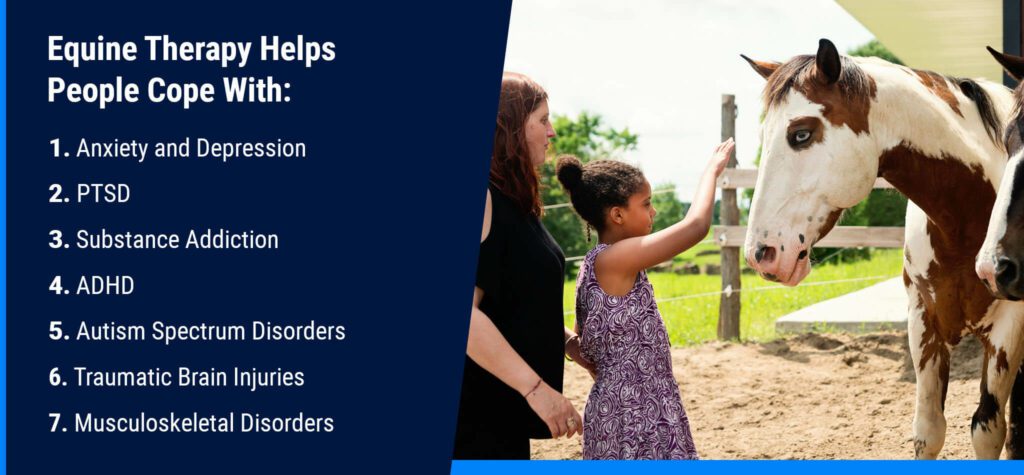8 Reasons Why Equine Therapy Is Effective

What Is Equine Therapy?
EAT, or equine-assisted therapy, is a widely implemented therapeutic program designed to help people with psychological, physical or substance abuse issues. Under the direction of a mental health professional licensed to administer equine-assisted therapy, EAT advocates that people perform activities related to caring for and bonding with a horse, such as leading, feeding, haltering and grooming.
Riding a horse may or may not be included in a personalized program, since the main focus of equine therapy is to help individuals develop their self-control, self-esteem, sense of responsibility and self-confidence.
Is Equine Therapy Effective?
Loyal, loving and trustworthy, horses are animals that humans have always bonded with almost effortlessly. Even the ancient Greeks noticed how both unstable and “typical” people seemed calmer and happier when interacting with a horse. Something about the gentle, patient nature of a horse helps rebuild confidence and trust in people who suffer from psychological or physically debilitating issues.
Horses are large and powerful animals, and they can often be intimidating to people who have little experience around them. However, equine-assisted therapy is designed to help people overcome that initial intimidation to develop a deep, lasting bond with the animal.
Equine-assisted therapists think it is the formidable appearance of horses combined with their gentleness and accepting nature that helps people in mental health, substance recovery or physical therapy programs learn about themselves while exploring the benefits of empathy and trust.
Horses also have distinct personalities that are conducive to the bonding effect necessary for equine therapy patients to achieve their program goals. Just like people, horses can be extroverted, shy, a little stubborn and genuinely affectionate. Nothing is more therapeutic than knowing you have a loyal, loving friend who will greet you every day with tail swishes, “nosings” and a deep desire for your company.
Horses are also sensitive animals that immediately empathize with humans who take care of them daily. By reacting to body language and mirroring the moods of their caretakers, horses make the perfect, nonjudgmental “therapist” by non-verbally providing insight into a person’s negative behaviors.
Who Benefits From Equine Therapy?
Equine-assisted therapy is useful for helping people cope with:
- Anxiety and depression
- Posttraumatic stress disorder
- Substance addiction
- Attention deficit hyperactivity disorder
- Autism spectrum disorders
- Traumatic brain injuries/neurological damage
- Musculoskeletal diseases/disorders
The effectiveness of equine therapy is also evident in people with eating disorders — they benefit from the unconditional acceptance offered by horses. In fact, those in treatment for anorexia or bulimia exhibit an increased ability to process painful memories and emotions associated with the negative image they have of their bodies. Nurturing and caring for a horse have empowering effects on most eating disorder patients.
Dialectical Behavior Therapy and EAT
Dialectical Behavior Therapy (DBT) is primarily based on mindfulness, a Buddhist concept that emphasizes acceptance and tolerance of powerful emotions, situations and disturbing events. Mindfulness emphasizes the benefits of paying close but nonjudgmental attention to the present moment — i.e., experiencing only the emotions and sensations that are happening right now.
When combined with DBT, equine therapy promotes the ability for people to engage in meditation and mindfulness by reinforcing their capacity to focus on something other than themselves. In fact, practicing mindfulness has been found to increase portions of the brain associated with the higher faculties. Several studies have also discovered that adults who continually practice mindfulness feel a greater sense of creativity, curiosity and well-being.
8 Benefits of Equine Therapy

Some of the direct benefits of equine therapy include the following:
- Caring for and/or riding horses improves muscle tone, coordination and walking habits (especially important to people with cerebral palsy, muscular dystrophy or other neuromuscular disorders).
- Interacting daily with horses improves overall well-being, self-esteem and self-confidence in people suffering from social anxiety, panic disorders, phobias and substance addiction.
- In children with ADHD, equine therapy can help reduce problems with concentration, attention and completing tasks without becoming distracted.
- Equine-assistance therapy encourages development of perseverance, respect for living beings, maintenance of a positive attitude and empathy.
- People who have problems engaging in meaningful relationships get to enjoy the deep satisfaction of bonding with a living creature that presents many human characteristics.
- Studies have shown that substance abusers in recovery programs with equine therapy experience reduced feelings of resentment, guilt, regret and “fears about the future.”
- EAT can dramatically improve the quality of life for people with debilitating PTSD symptoms. Horses are hyper-vigilant when in unfamiliar conditions, and PTSD patients can readily relate to this sense of hyper-awareness.
- Recovering cancer patients involved in equine therapy find that taking care of a horse relieves their fears, improves their ability to focus on the moment and encourages development of meaningful relationships with other cancer survivors in EAT.
Keeping Therapy Horses Healthy
For the past 35 years, Kauffman’s® has been one of the leading sources of all-natural, organic horse nutritional supplements. Professional horse enthusiasts working in the horse racing, veterinary and training fields know they can depend on our products for superior quality, and they can depend on us for exceptional customer service.
Kauffman’s® products for horses include horse nutritional supplements that may improve muscle, hoof, joint, skin and digestive health, helping to calm anxiety and maintain optimal weight. In addition, our facility is certified in the American Feed Industry Association’s Safe Feed/Safe Food Certification Program.
